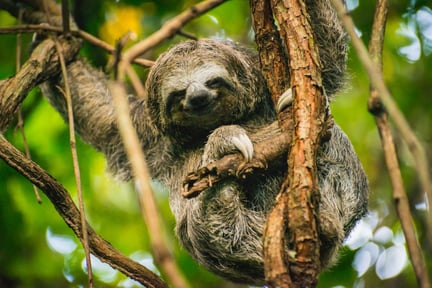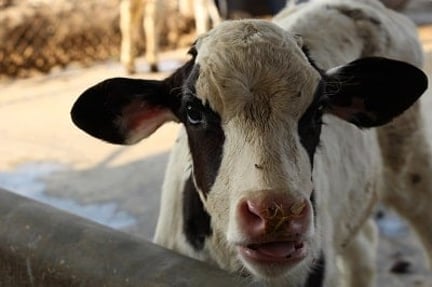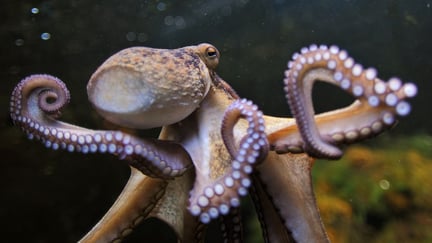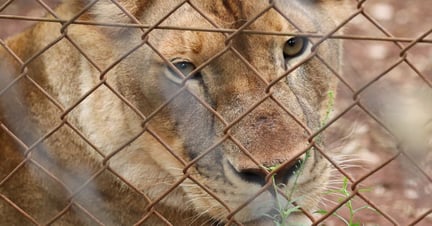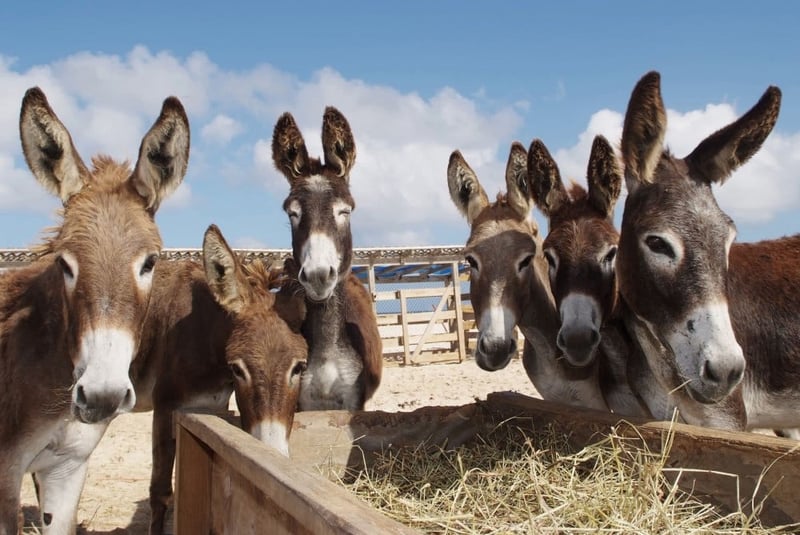
10 Interesting Donkey Facts You Should Know
Blog
Maybe you didn't know it, but donkeys are much more than pack animals: they are intelligent, sentient, and surprisingly strong.
Have you ever heard someone use "you're a donkey" as an insult? It's time we stop underestimating these incredible animals.
We know that donkeys are intelligent, emotional, and deeply loyal creatures who deserve far more respect and protection than they currently receive.
Far from being clumsy or unintelligent, donkeys are noble-hearted animals with strong social bonds and a gentle nature. Their patience and resilience make them remarkable companions, especially in rural communities around the world.
Curious to learn more about donkey behaviour, intelligence, and why they need our help?
Here are 9 fascinating facts that highlight the importance of donkey welfare:
1. Donkeys have an exceptional sense of smell
Donkeys have a highly developed sense of smell that allows them to detect odours from up to 10 kilometres away. This natural ability helps them locate water and food in dry, expansive landscapes - a critical skill for survival in arid regions.
2. Donkeys are highly intelligent
Scientific studies have shown that donkeys can solve complex problems and make decisions based on risk assessment.
Unlike horses, who tend to flee when startled, donkeys pause to evaluate danger. This thoughtful approach is often mistaken for stubbornness - but it's actually a sign of intelligence.
3. Donkeys have impressive memories
Donkeys can remember other animals, places, and people they've encountered even years later. Their long-term memory helps them navigate challenging environments and maintain social connections with fellow donkeys.
4. Donkeys communicate through vocalisations
Donkeys are capable of vocalising while both inhaling and exhaling, allowing them to bray for up to 20 seconds. Their calls can travel as far as 3 kilometres.
Braying isn't just noise - it's a form of communication. Donkeys use different sounds to express emotions, signal danger, or call out to others. These vocalisations are a crucial part of donkey behaviour and herd dynamics.
5. Donkeys express emotions through their faces
Non-verbal communication is a key part of donkey behaviour. Subtle changes in facial expression - including eye position, ear movement, and muscle tension - reveal how a donkey is feeling.
Understanding these signals can help us better meet their welfare needs and recognise signs of stress or discomfort.
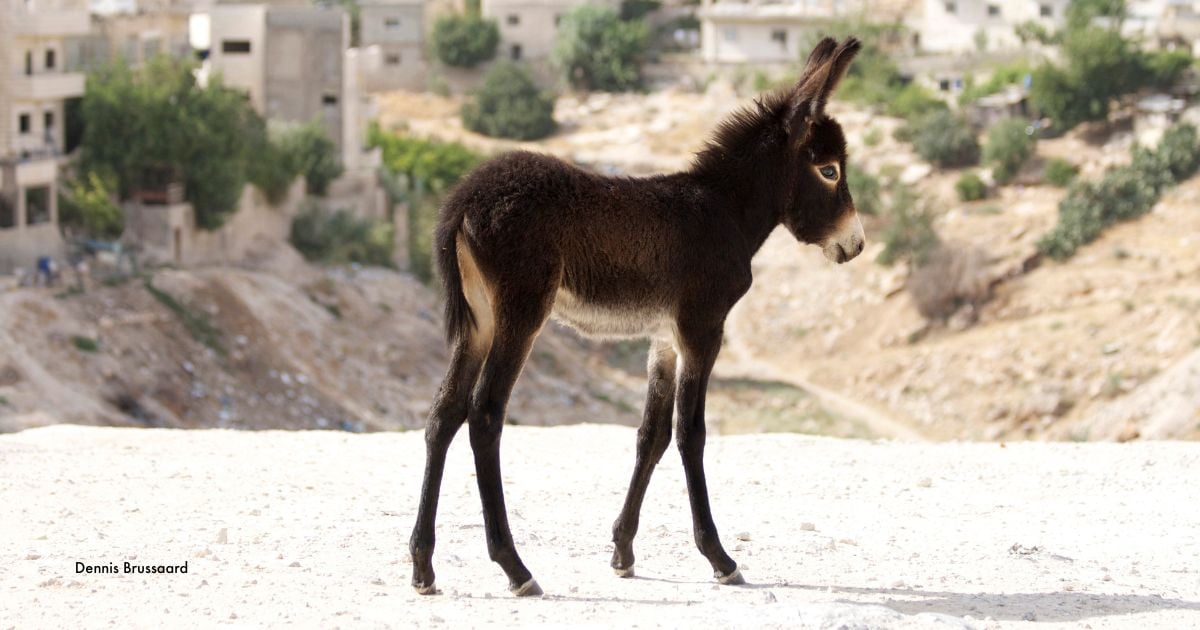
6. Donkeys are built for resilience
Modern donkeys descend from the African wild ass, an animal adapted to survive in extreme heat with very little water.
Donkeys' long ears help regulate body temperature and their tough coats protect them from both heat and cold. Their endurance has made them essential in communities where access to resources is limited.
7. Donkeys protect other animals
In many rural areas, donkeys act as livestock guardians, protecting sheep and goats from predators like foxes and wild dogs.
Their alertness, strength, and protective instincts make them invaluable on farms - yet they are often overlooked in discussions around animal welfare.
8. World Donkey Day is celebrated on 8 May
Just like cats and dogs, donkeys have their own day of recognition. World Donkey Day, celebrated on 8 May, is an opportunity to raise awareness of donkey welfare and the challenges these animals face.
We use this day to campaign for better protections and to shine a light on global donkey abuse.
9. Donkeys are victims of abuse and exploitation
Across the world, donkeys suffer from mistreatment, overwork, and neglect. Many are forced to carry heavy loads under harsh conditions, with little access to rest, water, or veterinary care.
In Mexico, the case of the Zacatecas donkey has drawn attention to the need for stronger laws against animal cruelty. In Spain, working donkeys are still exploited for transportation - despite evidence of poor conditions and abuse.
We support the efforts to end these practices and ensure donkeys are treated with the compassion they deserve.
10. Donkeys are victims of traditional medicine
In addition to the threats already mentioned, donkeys also suffer as a result of the demand for certain products used in traditional medicine.
One alarming example is the trade in ejiao, a gelatin made from donkey skins that is used in traditional Chinese medicine. The growing demand for ejiao has led to the mass slaughter of donkeys in several countries, decimating their populations and causing devastating impacts on the communities that depend on them.
World Animal Protection advocates for the use of plant-based alternatives. We promote sustainable and ethical solutions that do not involve the suffering or killing of animals. By choosing these alternatives, consumers can help protect donkeys and safeguard their welfare.
Why donkey protection matters
Donkeys are more than working animals. They are sentient beings with emotions, social needs, and a right to live free from suffering.
At World Animal Protection, we believe that by learning more about donkeys, we can all become stronger advocates for their welfare.
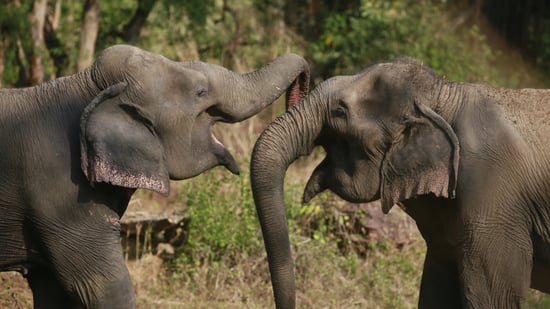
Donate now
When you make a donation, you’ll join a passionate group of supporters who are determined to change the world for animals. We're fighting animal cruelty wherever we find it — are you with us?
DonateFrequently Asked Questions about donkeys
What do donkeys eat?
Donkeys are herbivores and primarily eat grass, hay, herbs and bushes.
They are highly adaptable and have evolved to survive on a simple, low-nutrient diet, especially in dry or rugged environments. Their digestive system is extremely efficient, allowing them to absorb water from food and extract nutrition from a wide variety of plants.
Providing proper nutrition is essential for donkey welfare, especially for those used as working animals in rural communities.
How do donkeys breed?
Female donkeys (jennies) give birth to baby donkeys, called foals.
Donkeys have one of the longest gestation periods among domestic animals at around 12 months. After birth, foals remain close to their mothers and develop strong social bonds from an early age.
Ensuring donkeys can reproduce naturally in safe, healthy conditions is a key part of safeguarding endangered breeds.
What is a mule?
A mule is a hybrid animal, born from the cross between a male donkey (jack) and a female horse (mare).
Mules inherit endurance, intelligence and strength from both parents, which has made them popular as working animals across many cultures.
However, because of their mixed genetics, mules are typically sterile and unable to reproduce.
What do donkeys like?
Donkeys are highly social animals. They enjoy bonding with other donkeys and often form lifelong friendships. They also seek connection with trusted humans and can recognise individual voices and faces.
In addition to companionship, donkeys love rolling in the dirt - a natural behaviour used for grooming, marking territory and stress relief. Providing enrichment and opportunities for social interaction is essential for good donkey welfare.
What do donkeys symbolise?
Across cultures and history, donkeys symbolise humility, patience, resilience and strength.
In Christian tradition, the cross-shaped mark found on many donkeys' backs is believed to be a symbol of Jesus' gratitude during the entry into Jerusalem. In Arab culture, donkeys are often seen as loyal and hardworking animals.
These symbolic meanings reflect the close relationship between humans and donkeys - one that must now evolve into protection and care.
Why do donkeys have a cross on their back?
Many donkeys have a distinctive dark stripe running down their spine and across their shoulders, forming a cross-shaped pattern.
While legends offer religious explanations, science attributes this to genetics and coat patterning. The same genes responsible for striping in animals like zebras may explain this trait in donkeys.
Are donkeys in danger of extinction?
Yes. According to the IUCN Red List, the wild African donkey (Equus africanus) is critically endangered.
Several domestic donkey breeds are also at risk, such as the Zamorano-Leon's donkey in Spain. But extinction isn't just a conservation issue - it's an animal welfare crisis.
One of the most alarming threats today is the donkey skin trade. Millions of donkeys are slaughtered every year for ejiao, a traditional Chinese medicine made from donkey hide. This demand is decimating donkey populations, especially in Africa, and tearing apart communities who rely on them.
The greatest threat to donkeys is human exploitation. Around the world, donkeys suffer from overwork, malnutrition, lack of veterinary care and cruel treatment.
We are calling for better practices to ensure their welfare and to stop the exploitation of animals worldwide.
It is time to give them the respect and protection they deserve.
Related content
Animal Sentience
At World Animal Protection sentience is at the heart of everything we do, click to find out more.
Traditional medicine
Ending commercial exploitation
Ending the exploitation of wild animals used in Traditional Medicine
Cow facts: social, friendly and more than milk machines
Blog
Read our top cow facts and discover just how clever these emotional, sentient bovines are and why — like all animals — they deserve our respect.
